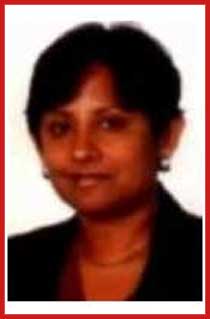 Dr. Anita Mehta
Dr. Anita Mehta was born in Calcutta: after her schooling at La Martiniere for Girls, she did her undergraduate degree (with honours in Physics) at Presidency College, Calcutta. In 1978, she was awarded the Rhodes scholarship to Oxford, the second Indian Woman to be thus honoured - she there obtained her Masters and doctoral (D.Phil) degrees theoretical physics. She then worked in IBM New York, Cambridge University, I Birmingham University before returning to India to take up an academic position at the S N Bose National Centre, Calcutta, where she currently works. Dr. Mehta has worked in many fields, using the tools of statistical physics to explore diverse themes - some examples being game theory (economics), nonlinear dynamical systems, theories of surfaces and interfaces, and most recently, a cosmological model for the aggregation of black holes. The focus of her current research lies in the field of complex systems - examples of such systems abound in the natural and human world, ranging from stock markets to earthquakes. All these systems, different as they are, manifest complexity in their physical behaviour, via the presence of memory and the competition of slow and fast relaxation rates in their dynamics.
Within this general area, Dr. Mehta has specialised in the physics of sandpiles - she is internationally recognised as being one of the pioneers of this field. Sandpiles are particularly fascinating examples of complex systems, as they manifest athermal behaviour - for example, a sandpile remembers its conditions of formation for a very long time, as grains of sand are not subject to the violent agitation ('Brownian motion') that liquid molecules feel at room temperature. It is also prone to jamming: that is, its stable states have arrangements that are far from the crystalline structure of most solids. All of this leads to physics that is very unusual, the study of which forms part of cutting-edge research internationally. Applications of complex systems research are manifold: there are strong implications for earthquake dynamics, which have assumed a particularly chilling significance in the contemporary context. Additionally, they can be used to study social systems, such as patterns of learning behaviour, or the propagation of technologies; and of course there are many implications within the natural sciences, such as Pharmaceuticals, civil engineering, nanotechnology and most recently, biological systems. Dr. Mehta's vision for the future, comprises both the continuation of novel aspects of her current research as well as its generalization to include many more of the areas mentioned above.
